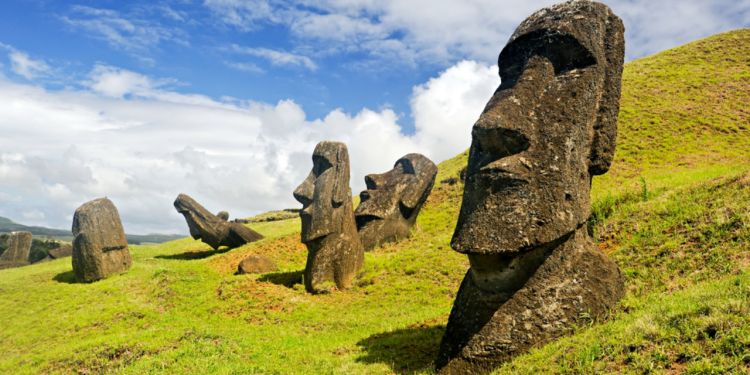
If you have always dreamed of visiting Chile in all its glory, hiking and trekking, walking on glaciers, visiting wine routes, looking at the stars under clear skies and enjoying the hot springs while taking your time — and all the while having a job to help finance your stay — the Working Holiday Visa could be the solution for you! In this article, you can find all the information you need to apply for a WHV in Chile.
From north to south and east to west, Chile is a truly fascinating country. Its geographical isolation, rich and thriving culture and diversity make it one of the most attractive and fascinating holiday destinations in the world. From its gastronomic delights to its wide variety of art, traditional dances and sports, Chile is truly unique and well worth a visit.
Conditions to be met for obtaining a Working Holiday Visa for Chile
For your application to be considered at the Chilean Consulate or Embassy, you must meet the following requirements:
1. Your nationality
In order to be eligible for the Working Holiday Visa in Chile, it is mandatory that you come from one of the countries that have signed a WHV agreement with Chile! These countries are Canada, France, Germany and New Zealand.
Good to know:
Just because you live in one of the countries mentioned above does not mean you are eligible! You must have one of the nationalities required.
2. Your age
As with all other WHV agreements around the world, an age limit is set for each country. For the WHV in Chile, here are the age limits by country:
- Germany: 18 to 30 years old
- Canada: 18 to 35 years old
- France: 18 to 30 years old
- New Zealand: 18 to 35 years old
This means that Germans and French will have until the day before their 31st birthday to apply. Canadians and New Zealanders will have until their 36th birthday to submit their application at the Chilean embassy or consulate in their respective countries. However, we advise you not to wait until the last moment to apply!
3. Having a valid passport
To apply for the WHV, you must have a passport that is valid and will remain valid for your entire stay — a minimum of 12 months. It is important that your passport also contains blank pages (at least 2 pages) so that your visa can be placed in it and there is enough room for the arrival and departure stamps that will be affixed by the customs authorities.
Important:
It is strongly recommended that you keep your passport safe once you have received your visa. In case your passport is lost, the process of reissuing your visa could be very complicated.
Good to know:
If you have more than one nationality, it is important that you present the passport of a country that has signed the agreement.
4. Having sufficient funds
One of the first things to plan for when traveling abroad is budgeting/saving! And as with any other trip, your WHV in Chile will require that you have enough money to cater to all your needs.
France, for example, requires a minimum of 2,500 euros in the participant's bank account. Although no specific amount is mentioned for Canadians, Germans and New Zealanders, they will need to present a return air ticket in addition to their savings.
Good to know:
You will need to provide proof of funds or an official bank statement signed by your bank.
4. Having a medical insurance policy
You will need to have a health insurance policy in place for your application to be approved. And while you will need to be covered for all cases of illness, repatriation, hospitalization, disability and maternity in order to receive your visa, it is also mainly about being covered when you are thousands of miles away from home and not being left with a huge bill to pay!
You will need to show proof of insurance that will cover you for your entire stay — a minimum of 365 days — when you apply for the WHV visa.
5. First-time participation
As with most WHVs around the world, you will only be limited to one entry. This means that if you have already been on a WHV in Chile, you will not be able to go a second time. However, if you have already participated in a WHV program anywhere else in the world, for example, in Japan, Australia, Spain, or Colombia, this will not be a problem at all.
Good to know:
If you have two nationalities from countries with agreements with Chile — for example, French and German — and you have already been to Chile with one of the two nationalities, you will unfortunately not be able to apply with the second. Each participant can only take advantage of the WHV in Chile once.
6. The country quota
When a WHV agreement is signed between two countries, a quota is usually established per country. This allows the host country to have some control over the number of entries per year. Here is the quota for each signatory country:
- Germany – unlimited number of places (which means you won't have to worry about getting a place!)
- Canada - 750 places
- France - 400 places
- New Zealand - 300 places
Good to know:
Note that quotas are updated every year on 1 January, so to be sure of securing a place, it's best to apply early in the year!
7. Airline tickets
Tickets are usually booked after you have been awarded your WHV. But you will need to prove that you can afford them when you apply.
8. Having a clean criminal record
You will need to provide a clean criminal record when you apply for the WHV. You will need to obtain a record from your home country that states that you have never committed a crime.
9. Duration and price of the visa
After receiving your visa, you will have 3 months, that is, 90 days, to travel to Chile. Once you are there, you will have the right to live and work for a whole year in any part of Chile!
The participation fee is US$135 — which you will need to pay with a credit card when you collect your visa.
Good to know:
You are not allowed to bring dependents with you on the WHV in Chile! If your spouse or other family member wishes to accompany you, they also have to be eligible under the conditions and will need to make a separate application which will be processed independently.
How to apply for a Working Holiday Visa for Chile?
The list of supporting documents you need to include with your application may vary depending on the country you are from. But in general, to apply for a WHV permit for Chile, you will need to provide:
- A cover letter explaining why you want to go to Chile on a WHV,
- a duly completed visa application form,
- a copy of your valid passport,
- two recent passport photos (3.5 x 4.5 cm)
- a birth certificate,
- a return ticket or proof that you have sufficient funds to purchase one,
- a certificate of insurance,
- a medical certificate proving that you are in good health,
- proof of sufficient funds to cover your living expenses,
- a clean police certificate - in other words, a clean criminal record not older than three months.
Useful addresses:
Consulate General of Chile in Paris - France
64 Bd de la Tour-Maubourg,
75007 Paris,
France
Consulate General of Chile in Montreal - Canada
1010 Sherbrooke Street W #710,
Montreal,
QC H3A 2R7,
Canada
Embassy of Chile in Berlin - Germany
Mohrenstraße 42,
10117 Berlin,
Germany
Embassy of Chile in Wellington - New Zealand
The Pencarrow House,
1 Willeston Street,
Wellington Central,
Wellington 6011,
New Zealand
Things to consider before moving to Chile on a WHV
The cost of living in Chile
Before traveling to Chile, we recommend that you have an idea of the cost of living in order to prepare your budget.
Here is a table, including the basic costs to expect during your stay, which will give you an idea of the cost of living in Chile - (source Numbeo; as of July 2022):
Currency: US Dollars (USD) | |
Rent | |
1-bedroom flat (in the city center) | 400.12 |
1-bedroom flat (outside the city center) | 346.99 |
3-bedroom flat (city center) | 714.13 |
3-bedroom flat (outside the city center) | 610.05 |
Utilities | |
Water, electricity, air conditioning, heating, waste collection for an 85m² apartment | 120.28 |
Internet (60 Mbps or more, ADSL/cable, unlimited data) | 25.60 |
Transportation | |
1 ticket (one way) for local transport | 0.79 |
Monthly pass for local transport | 339.71 |
Shopping/groceries | |
Rice (1 kg) | 1.25 |
Milk (1 L) | 1.00 |
12 eggs (normal size) | 2.47 |
Bread (500 g) | 1.05 |
Chicken (1 kg) | 5.16 |
Red meat (1 kg) | 9.56 |
Oranges (1 kg) | 1.52 |
Bananas (1 kg) | 1.25 |
Apples (1 kg) | 1.55 |
Potatoes (1 kg) | 1.06 |
Onions (1 kg) | 1.14 |
Water (1.5 L) | 1.08 |
Wine (mid-range bottle) | 4.54 |
Local beer (0.5 L) | 1.26 |
Imported beer (0.33 L) | 1.97 |
Cigarettes (pack of 20) | 4.88 |
Leisure | |
Movie theatre - 1 seat | 5.67 |
Sports club - monthly cost for 1 person | 32.66 |
Looking for accommodation in Chile
The search for accommodation is essential when preparing for your departure to Chile. What budget have you planned for your accommodation? What type of accommodation do you plan to rent in Chile (a youth hostel, a shared apartment, a single room in a hostel, a flat with or without a kitchen, a studio, or a house with a garden)? In which regions of Chile do you plan to stay?
Airbnb is, of course, a classic when it comes to searching for accommodation and even allows you to compare rates for the type of accommodation you are looking for on a map. You can also find accommodation options in Chile (temporary or longer term) on Roomi or Comparto Depto.
Looking for work in Chile
In order to find a job in Chile, you have two options: find a job through your personal network (basically, by having a piston or a "pituto" as the Chileans say) or by searching through job platforms. Here are the most popular portals used in Chile:
- Indeed.cl.
- Laborum.cl
- Trabajando.cl
- Computrabajo.cl
If you don't have any specific expertise yet or an idea of a profession you'd like to do when you're in Chile, here are some ideas that don't necessarily require experience and could help you make some money - au pair, nanny, or language teacher. Also, consider volunteering and woofing!
Learning the Spanish language
It's probably no secret to you at this stage — the official language of Chile is Spanish. Only 10.2% of the population speaks English! This means that if you want to understand and be understood, you will have to make an effort and learn a minimum of Spanish. There are several applications that will help you to do this:
- Duolingo
- Babbel
- Pimsleur
- Lingopie
- Busuu
- Memrise
- Fluentu
- Brain Pop
The first steps to take on arrival in Chile
Get your visa validated - Certificado de registro
Once you arrive in Chile, you will have 30 days to go to the International Police (PDI) to have your visa validated. This will cost 800 Chilean pesos (CLP), and you will need to bring your passport, provide a Chilean telephone number where you can be reached and an address (your accommodation, even if it is only temporary).
The RUT/RUN (cédula)
The RUT (also known as the RUN) is essential for working or opening a bank account in Chile - it has the same equivalence as the national insurance number. The RUT will also come with your 'Cédula' card (Solicitud de Cédula de Identidad Extranjeros), which is an identity card for foreigners in Chile.
This process will require you to provide:
- The certificate that you will have received from the International Police (PDI) a photocopy
- Your passport a photocopy of the second and third page of your passport, a photocopy of your visa and a photocopy of the stamp you received on the day you entered Chile.
Useful links:
We do our best to provide accurate and up to date information. However, if you have noticed any inaccuracies in this article, please let us know in the comments section below.








